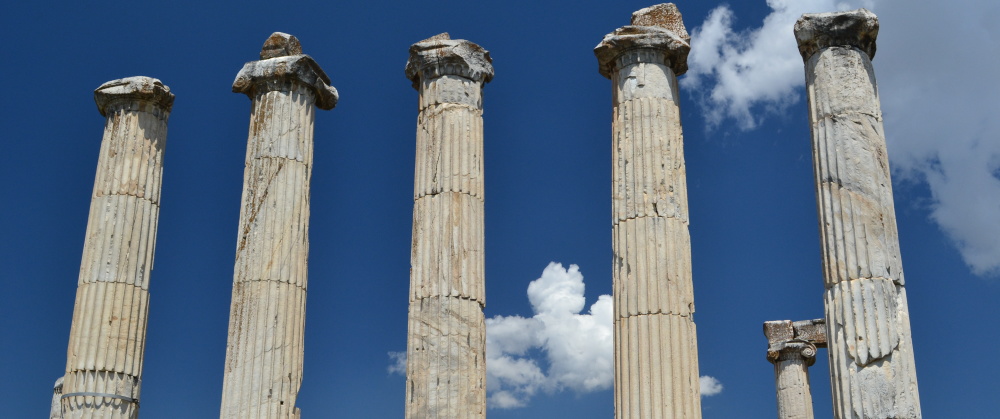One of the biggest problems with studying Paul and the world in which he lived, moved, and had his being is the modern Christian baggage that we bring to the table. When many Protestants read Paul, they read Martin Luther’s and the Reformation’s Paul. Still, others read Paul in light of 2,000 years of Christian doctrine and believe that Paul worked with Chalcedonian and Nicean Christologies (which is clearly false); and that Paul was a Christian. However, Paul never uses the term and if we allow Paul to speak for himself, he says he is an Israelite and a Jew who confesses Jesus as the Messiah.
Notwithstanding our Christian baggage with Paul, we also bring it to the study of his world. In the early 20th century, because they could not fathom humans worshiping other living humans, many dismissed the phenomenon of Roman emperor worship as something devoid of all religious sentimentality. However, since the late 1970s and early 1980s, a turn has occurred in thinking about emperor worship. Many scholars are now aware of their modern Christian biases and the dangers of projecting them back on the Roman world. That is, looking for a similar Christian religious experience in ancient Roman religion. Moreover, noting that Roman religion was a religion of orthopraxy and not orthodoxy and accepting that the religious experience of the ancient Romans and Greeks was fundamentally different than the modern Christian experience, great work is being done in the area of emperor worship.
For example, I just finished Takashi Fujii’s excellent treatment of emperor worship on the island of Cyprus (an island Paul and Barnabas visited on their first missionary journey cf. Acts 13.4-12), Imperial Cult and Imperial Representation in Roman Cyprus (Stuttgart: Franz Steiner Verlag, 2013). Fujii’s work should be highly praised and read by everyone working on emperor worship, for he shows how different emperor worship could be across the diverse Mediterranean Basin. From his work, two things stuck out to me. First, he concludes that emperor worship on Cyprus differed from emperor worship in Asia Minor in that it “was part of a system that functioned without direct do ut des relationship between the emperor and the Cypriots” (p. 157). Thus: “this fact illuminates one of the most important characteristics of the imperial cult—the provincials venerated the emperor, not because he benefitted them in a direct way (with financial support and political benefaction), but for the very reason that he was the emperor of the Empire to which the provincials belonged” (p. 157). That is, while the denizens of Asia Minor had reason to worship to the emperor because of his continuous beneficence and aid to their cities, the inhabitants of Cyprus did not receive that kind of attention from the emperor. As a result, instead of having a practical reason to worship the emperor, i.e., he constantly provided money, games, buildings, etc. to the island, the Cypriots worshiped the emperor because he was the emperor!
This grass roots desire to worship the emperor is evident in my second take away from Fujii’s work. Fujii provides new critical editions and translations of some inscriptions from Cyprus. Four of these inscriptions are a testimony to individuals venerating and worshiping the emperor. First, a Greek inscription evidences that a certain man named Adrastos set up a temple for Tiberius Caesar Augustus in the gymnasium, instituted a hereditary priesthood for it, called himself and his son a “lover of Caesar,” and even called Tiberius his god:
“To divine Tiberius Caesar Augustus, son of the divine Augustus, Imperator, pontifex maximus, holder of the tribunician power 31 times . . . Adrastos, son of Adrastos, lover of Caesar, hereditary priest of the temple and statue of Tiberius Caesar Augustus, which he founded at his own cost in the gymnasium, . . . founded the temple and the statue for his own god at his own expense. . . . Adrastos, son of Adrastos, lover of Caesar, consecrated (them) with his son Adrastos, lover of Caesar, . . . at his own cost, on the birthday of Tiberius . . .” (Lapethos no. 2; Fujii, Imperial Cult, 179-80).
Second, individuals dedicated votive offerings to the emperors. This means that they made vows to the emperors in the same manner they did to the gods and goddesses.
“Onesilos? (dedicated this) to Apollon Kaisar on behalf of his wife Themisphas in fulfillment of a vow. . .” (Kourion no. 7; Fujii, Imperial Cult, 173).
“Polyktetos, son of Timon, potter, (dedicated this) to Apollon Hylates and Apollon Kaisar on behalf of himself in fulfillment of a vow . . .” (Kourion no. 8; Fujii, Imperial Cult, 174).
“Sextus Cornelius Tychikos, having made a vow, (dedicated this) to Apollon Hylates and Apollon Kaisar” (Kourion no. 10; Fujii, Imperial Cult, 174).
Consequently, Fujii’s work is a great example of documenting the actions that individual Cypriots took toward the emperor. Actions that are a window into their beliefs about the divinity of their hegemonic overlords, i.e., to act is to believe in Roman and Greek religion.

